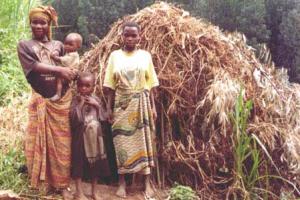Wherever the pulp and paper industry operates, it brings with it the promise of jobs. Unfortunately, for the people living in the area that the industry takes over, these promises rarely bring work. In a recent report for World Rainforest Movement, Alacri De'Nadai, Winfridus Overbeek and Luiz Alberto Soares, record how Aracruz Celulose, the world's largest producer of bleached eucalyptus pulp, has failed to provide work for local people.
Brazil
Bulletin articles
12 October 2005
Six months ago, indigenous Tupinikim and Guarani people reclaimed just over 11,000 hectares of their land from the Brazilian pulp giant Aracruz Celulose. They chopped down thousands of eucalyptus trees to demarcate their territory and built two indigenous villages with a large meeting house and several other houses on the land. Several indigenous families are living in the houses.
Bulletin articles
14 July 2005
What is happening in Brazil is a historic event, not only for Brazil, but for all of us who are struggling against the advance of large scale monoculture tree plantations.
Other information
13 June 2005
“The worst immorality is a studied ignorance, a purposeful refusal to see or know” (Andrea Dworkin)
Bulletin articles
20 May 2005
In 1979, when occupying one of the last remaining forest areas of the Mata Atlântica (Atlantic Rainforest), not yet cut by the former Aracruz Florestal --currently Aracruz Celulose-- the Tupinikim and Guarani indigenous peoples in the State of Espírito Santo started a long struggle to get their lands back. This struggle was interrupted in 1998, when Tupinikim and Guarani indigenous communities, isolated and under great pressure, had to sign an agreement with Aracruz Celulose.
Publications
18 May 2005
This paper presents and analyzes data about employment and work in eucalyptus plantations and cellulose production for export in the state of Espírito Santo, more specifically about the company Aracruz Celulose, leader of the sector in Brazil.
Bulletin articles
21 March 2005
The world's largest producer of bleached eucalyptus pulp has plans to become even bigger. Last year, Aracruz Cellulose produced 2.5 million tons of pulp. The company is looking at five possible sites to build a new, one million tons a year pulp mill. Over the next two years, Aracruz will spend US$600 million on upgrading its existing pulp mills and expanding its 305,000 hectare plantation area.
Other information
21 March 2005
For the second time, the Clean Development Mechanism's (CDM) Executive Board has rejected the reasons of Vallourec & Mannesmann do Brasil for requesting carbon credit money for industrial tree plantations.
Bulletin articles
22 February 2005
The World Social Forum is not a space for dreaming, but a place for sharing ideas on how to make a common aspiration come true. The message is clear: another world IS possible. What world? A world where social justice prevails, where peace is a reality, where nature is respected, where people interact as equals.
Bulletin articles
22 February 2005
A number of participants at the World Social Forum 2004 met in Mumbai and believing that forest issues are in essence social and political and that forest communities are increasingly affected by globalization --and new forms of trade and economic liberalization that comes in its way-- agreed on the need to create a global movement to ensure forest conservation and peoples' rights over forests. The principles on which the movement would be based were agreed upon and circulated by the groups as the Mumbai Forest Initiative - Statement of Principles.
Other information
22 February 2005
In 1972 the Norwegian group Borregaard set up a pulp mill in the State of Rio Grande do Sul, a few kilometres away from the City of Porto Alegre, (municipality of Guaiba), on the banks of the river Guaiba. This mill was to close down in 1975 as a result of public pressure against the contamination it was causing. That same year it was purchased by the Klabin Company, and reopened under the name of Riocell.
Bulletin articles
22 February 2005
In an increasingly fragmented and specialized world, very often social and resistance responses are inevitably fragmented and specialized. Many social organizations are devoted to an issue, very often removing themselves from the whole.


